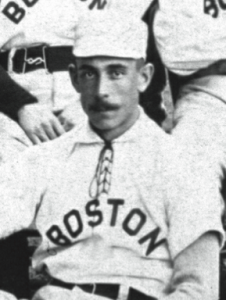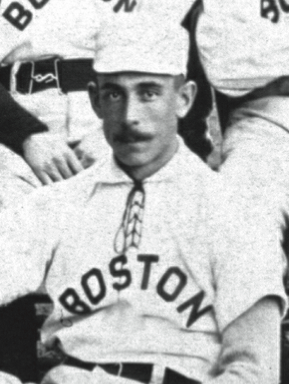June 11, 1891: Beaneaters’ hot bats earn series split with Colts
 The fourth-place Boston Beaneaters hosted the Chicago Colts at the South End Grounds for the finale of a four-game series on June 11, 1891. The Colts appeared to have no trouble in winning the first two games of the series, taking the opener 5-3 and the second game, the following day, by 9-7. In the third game, a sharp turn of events had the Beaneaters blanking the first-place Colts, 13-0. That win gave the Beaneaters the opportunity to gain a split in the series.
The fourth-place Boston Beaneaters hosted the Chicago Colts at the South End Grounds for the finale of a four-game series on June 11, 1891. The Colts appeared to have no trouble in winning the first two games of the series, taking the opener 5-3 and the second game, the following day, by 9-7. In the third game, a sharp turn of events had the Beaneaters blanking the first-place Colts, 13-0. That win gave the Beaneaters the opportunity to gain a split in the series.
And win they did, with room to spare. The game was played in weather described by the Chicago Tribune as “fearfully hot.” The paper commented that the 2,761 spectators “suffered considerably.”1
The Colts named right-hander Ad Gumbert as their starting pitcher while the Beaneaters countered with another righty, Harry Staley. Gumbert went on to win 17 games in 1891, but was not at his best on this day. The Beaneaters’ Staley was a worthy opponent, and a proven stalwart on the mound, in his third of four consecutive seasons of winning at least 20 games. Gumbert was a younger brother of Billy Gumbert, who pitched for Pittsburgh and Louisville from 1890 to 1893. He was also a grand-uncle of pitcher Harry Gumbert, who won 143 games in his 15-year National League career in the twentieth century.
Boston took a 3-0 lead in the bottom of the second inning. Bobby Lowe, who would three years later ensure his permanent spot in the record books by hitting four homers in a game,2 slammed one to left to start the scoring.
The Colts tied the score in the top of the fifth inning, with two bases on balls and a home run by Jimmy Ryan.
The Beaneaters quickly responded in their half of the fifth, taking advantage of a leadoff walk to second baseman Joe Quinn, followed by errors by Cap Anson and catcher Malachi Kittridge that led to three runs and a 6-3 lead that was only the beginning. It was decidedly downhill for the Colts the rest of the game.
In the sixth Boston scored twice more on three hits, and continued its run production in the seventh with three runs coming from a combination of two hits, a walk, and three more Chicago errors. The Tribune told its readers, “From this on the game was devoid of interest and dragged to a close.”3
In his seven innings, Gumbert gave up 13 hits and five walks. His relief pitcher, Pat Luby, was touched for five hits and three walks. So the Colts pitchers yielded 18 hits and eight walks in this one-sided battle. The Colts defense, or lack thereof, certainly contributed to the bad news with eight errors, including three by catcher Kittridge.
Boston’s Bobby Lowe undoubtedly produced the most base hits in the game, but the scribes who reported his accomplishments did not agree on just how productive he was. Three newspapers (Chicago Herald, Lower Worcester Daily, and Boston Journal) wrote that Lowe had six hits in six at-bats. Three other papers (Chicago Tribune, Boston Globe, and Boston Advertiser) credited Lowe with five hits in six at-bats.
Tim Murnane’s account in the Globe sheds light on Lowe’s hit total for the day. In his fourth at-bat, Murnane wrote, Lowe “hit a fast one at third baseman Bill Dahlen that was sent wide of Anson. Some of the scorers gave it a hit, but it was stretching base ball rules and the Globe had to score it a misplay by Dahlen.”45
Errors were frequent in the game and some of the newspapers did not agree on how many miscues actually occurred. Of six observed newspaper descriptions of the game, two papers reported eight Colt errors, three reported nine, and one reported 10 errors for the Chicagoans. They also disagreed on the number of Boston errors: one paper reported only one Boston error, two papers said two errors, and three papers scored three errors for the Beaneaters.
In the four-game series that concluded with the 14-6 win over the Colts, the Beaneaters salvaged a split. The Colts recovered from their disastrous performances of the last two games, and appeared headed toward a first-place finish at season’s end. Not to be. Although the Colts held first place continuously from July 21 through September 29, they collapsed and lost their final four games of the season, allowing 50 runs in those losing efforts. The Beaneaters, not to be denied, won 25 of their final 33 games, to finish 3½ games ahead of the second-place Colts. Both teams had performed unusually well in the final two months of the season. The Colts and Beaneaters met 12 more times after June 11 game and the Colts won nine of those matches.
As for the June 11 game, the Chicago Tribune reported that Colts shortstop Jimmy Cooney was not at the ballpark but rather in Cranston, Rhode Island, “leading a fair maiden to the altar.”6 Jimmy, a native of Cranston, wed Ella Ann Dunham and that union resulted in four sons, two of whom (Jimmy and Johnny) went on to play major-league baseball.
By any measure, it was a subpar performance by the Chicago defense. The Globe said the Colts “played more like a Jim Crow team.”7 The Chicago Herald noted that “Chicago fielding at times was ‘very yellow.’”8 The Boston Advertiser commented, “Never did the Chicago team field more poorly that the one which played Bostons yesterday.”9 The Chicago Tribune, possibly in sympathy with the Colts, blamed pitching for the team’s poor showing, not commenting on the play of the defense.
Author David Fleitz’s SABR biography of Cap Anson mentions that many former Players’ Leaguers hated Colts manager Anson for his attitude toward them.10 He named Hugh Duffy and George Van Haltren as two who refused to return to Chicago, costing Anson much-needed talent. In the 1891 season, there were rumors that Boston opponents threw games to keep the pennant out of Anson’s hands.
Boston went 18-1-1 in its last 20 contests. Anson wrote in his autobiography that “a conspiracy was entered into whereby New York lost enough games to Boston to give the Beaneaters the pennant.”11 Anson believed that the Giants and other rival teams cheated him out of the league championship in 1891. He didn’t seem to mention the errors his team committed on June 11, however.
Sources
In addition to the sources cited in the Notes, the author consulted Baseball-Reference.com.
Notes
1 “New York Even With Us,” Chicago Tribune, June 12, 1891: 6.
2 Lowe accomplished the feat on May 30, 1894, in the second game of a morning-afternoon two-game set before a Memorial Day crowd at Boston’s Congress Street Grounds. It should be noted that Lowe’s home-run total for the entire season was 17, so four in a single game was a significant achievement. Lowe’s afternoon heroics followed his 0-for-6 record in the morning game.
3 “New York Even.”
4 T. H. Murnane, “Gumbert Was a Mark,” Boston Globe, June 12, 1891: 5.
5 “New York Even.”
6 “New York Even.”
7 Murnane.
8 “Gumbert Was a Mark,” Chicago Herald, June 12, 1891: 7. Note: The Chicago Herald and Boston Globe pieces did indeed bear the same headline, but the stories themselves were different.
9 “Gumbert’s Curves,” Boston Advertiser, June 12, 1891: 8.
10 David Fleitz, “Cap Anson,” SABR Baseball BioProject; sabr.org/bioproj/person/9b42f875.
11 Adrian Constantine Anson, A Ball Player’s Career: Being the Personal Experiences and Reminiscences of Adrian C. Anson (Chicago: Era Publishing Co, 1900), 295.
Additional Stats
Boston Beaneaters 14
Chicago Colts 6
South End Grounds
Boston, MA
Corrections? Additions?
If you can help us improve this game story, contact us.


